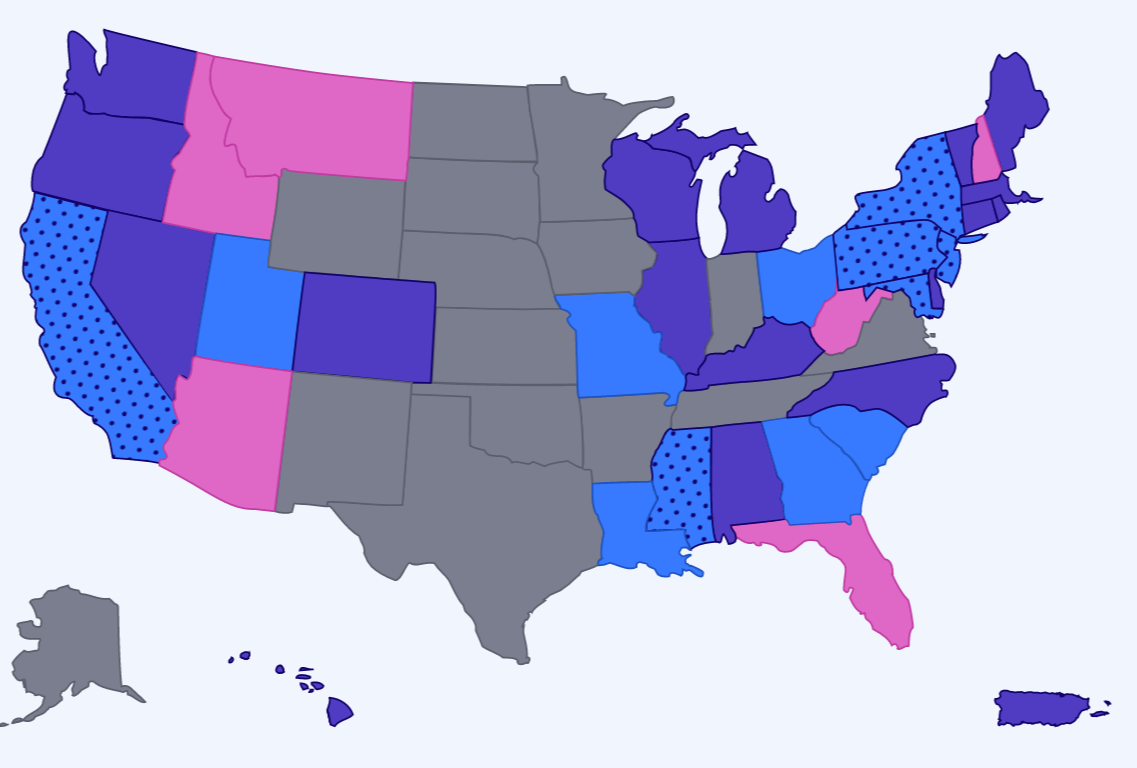
Are you confused about the myriad of rules and regulations related to salary history bans and pay transparency? Don't worry, you aren't alone! Lucky for you, we've scoured the interwebs to put together a handy, interactive map to help you navigate what you can (and can't) talk about when it comes to an applicant's previous pay, and what you're required to disclose as part of pay transparency.
Take me to the map!Want a bit more context? Here's the TL;DR...
In general, most laws prohibit employers from:
-
seeking, requesting, or asking about salary history;
-
reaching out to current or past employers;
-
considering, using, or relying on salary history as a factor in determining whether to offer employment or what salary to offer; and/or
-
retaliating against applicants who refuse to voluntarily disclose salary history information.
While pay transparency is on the rise - led by states like California, Colorado, New York and Washington - the rules around salary disclosures vary. In some cases, employers are required to share information upon request or after an interview, while in other cases, employers must post at least salary ranges on job openings (some laws additionally require disclosure of other types of compensation and/or benefits).
Compa has built an interactive map that includes up-to-date legislative information about pay transparency at the state level and, where appropriate, at the local level. In addition to current state and local laws, the map also includes information on pending state legislation and identifies states without pay transparency laws.
Click the map below for more information.

Want to go deeper and drop some knowledge on your colleagues? Read on...
A growing number of state and local governments have, or are, enacting laws both limiting what employers can ask about - or even consider - related to an applicants’ salary history and are requiring employers to provide salary ranges on job postings.
Because past pay discrimination was perpetuated (either consciously or subconsciously) when employers made decisions based on prior salary or under the guise of maintaining confidentiality among employees, the laws are meant to reduce pay inequity - especially for women and minorities.
Most state and local salary history bans share the same basic features, but no two laws are the same. If your company operates in multiple places across the country, or even within different parts of a state, it’s important to be cognizant of all the variations. Pay range disclosure is a newer concept, with only a few states / localities having passed legislation to date. However, similar to salary history bans, laws can differ widely in terms of disclosure requirements.
It’s important to note that while states have led the charge in passing laws, the federal government has not yet enacted a nationwide salary history ban or passed pay transparency legislation - for now. The Office of Personnel Management (OPM) recently proposed a salary history ban for federal jobs, which stands to reason, that where the government goes, so does the rest of the country. Additionally, there is a growing movement to augment limited language in the Equal Pay Act of 1963, most recently with a bill introduced in Congress - the “Salary Transparency Act” - that would require disclosure of pay ranges. For the moment, more finite considerations continue to exist only at state and/or local levels.
In just a few years, what started off as a few isolated laws aimed at creatively combating pay inequity has now become a nationwide trend - never mind that the legal landscape is constantly changing. Checking in frequently with your friends in HR is always a good idea.
Click on the button below (or map above) to review the states (and corresponding counties / cities) that have enacted rules governing the use of salary history and/or pay range disclosure.
The following sites provide additional resources and information.
- Salary history bans by state (AccuSource)
-
State by State: Salary History Bans and Pay Transparency Laws (SHRM, May 10, 2023)
-
50 State Equal Pay Reference Guide (JDSupra, March 30, 2023)
-
National Pay Transparency Bill Proposed (National Law Review, March 31, 2023)
-
The Push for Pay Transparency (SHRM, Oct. 22, 2022)
-
List of states and localities that require employers to disclose pay or pay ranges (HRDive, May 13, 2022)
-
Does your state prohibit asking salary history? (JD Supra, Sept. 9, 2021)
-
Salary history ban: Everything employers need to know (Fit small business, July 20, 2021)
-
Why salary history bans matter to securing equal pay (Center for American Progress, March 24, 2021)
-
Salary history bans — Know the limitations (Small Business Association of Michigan, March 6, 2021)
-
What states and cities have salary history bans? (Smith Hanley, March 4, 2021)
-
Know Your Rights: Pay Transparency (OFCCP, Sept. 2016)
Legal stuff: We have awesome folks at Compa, but none of us specializes, or is an expert, in employment law. We collect and collate data based on publicly available information, and while we hope it's helpful, recommend using at your own discretion and in conjunction with guidance from your in-house employment counsel.